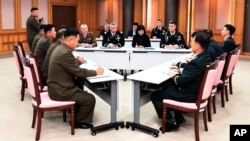North Korea, South Korea, and the United Nations Command (UNC) met Monday to further discuss plans to disarm the Joint Security Area (JSA) in the Korean Demilitarized Zone (DMZ). It follows a meeting last week where the three parties discussed ways of implementing a comprehensive military agreement signed during the third inter-Korean summit to achieve that goal.
United Nations Command deputy commander Lt. General Wayne Eyre said the UNC will adapt its mission to support current diplomatic efforts, and experts called for the organization to play an active role as the Koreas move toward reshaping the heavily fortified border into a peace zone.
Pyeongtaek University Professor Yun Jiwon tells VOA demilitarization has been an ongoing topic since the early 1990s between the Koreas, but until now, the right conditions to do so haven’t been present.
The meeting Monday was “aimed at checking and evaluating the status of demining operations at the JSA and consulting over schedules for withdrawing firearms and guard posts and adjusting guard personnel, as well as future plans for mutual verifications," Seoul’s defense ministry said in a statement.
As with the October 16 meeting, it was facilitated by North and South Korean colonel-level military officials and a member from the United Nations Command.
Gen. Vincent K. Brooks, Commander of United Nations Command said in a statement the talks last week “joined the existing Armistice mechanisms used by the Korean People's Army and the United Nations Command, with the more recent Korean People's Army and Republic of Korea military dialogue to further advance implementation of the CMA (Comprehensive Military Agreement)."
A pathway to peace
During the September Pyongyang summit, the two Koreas agreed to remove 11 guard posts within a 1 kilometer radius of the Military Demarcation Line by the end of this year.
Following last week’s meeting, Seoul's defense ministry said both sides will scale down personnel stationed there to 35 on each side in line with the armistice agreement, and share information related to their surveillance equipment. Furthermore, tourists from both sides and overseas will be allowed to freely come and go within the JSA. South Korean officials said they hope to begin rolling out the measure in about a month.
Yang Uk, Senior Fellow at the Korea Defense Forum urged caution. “A genuine detente is needed and [the government] should not make any decisions in a hurry,” he said.
“In the end, the plan should be guided by the UNC. They should be managing it… [the process] should be under the UNC’s order,” said Yang.
Joseph Yun, former U.S. Special Representative for North Korea Policy, said it is the little steps along the way that lead toward the final goal of denuclearization. His concern about the current, rapid pace of North-South dialogue is that the leaders are “out in front” and may not be giving sufficient time for working-level talks to set the necessary foundation for meaningful progress.
Demilitarization of the border region is an agreement between North and South Korea, and necessary to foster increased cooperation in the future said Yun, but it’s “not possible without consulting with the UNC.”
“The DMZ is under the UNC’s management; therefore, it’s necessary to have the UNC in this process,” said Yun.
At the October 16 meeting, it was also agreed to withdraw all firearms from the JSA.
Yang said that’s important, recalling an incident in February when North Korean troops fired machine guns at a defecting soldier.
Lt. General Wayne Eyre said the UNC is “committed to enabling the current diplomatic efforts” and these included, “The successful implementation of the comprehensive military agreement.”
Eyre added, that despite the challenges ahead, “The UNC will continue to fulfill his responsibilities in the ongoing, potentially decisively events that are playing out.”
“Current events give hope that the process of moving towards a lasting peace, along with denuclearization, is really making progress,” said Eyre.
Through a written statement, the UNC said it “is the home for international commitments with a mandate to restore peace and security in defense of the Republic of Korea. UNC coordinates multilateral engagement and provides a standing multinational framework for the integration of UN Forces into the command.”
More talks scheduled
Both Koreas will hold an additional round of talks Friday, October 26. Participants will hold the rank of general and are expected to further discuss the implementation of a military agreement reached when the two sides met at Tongilgak, a building on the North Korean side of Panmunjom.
The defense ministry said discussions will focus on how to form and run a joint military committee, whose responsibility it will be to enforce the agreement, and how best to form a joint research team for an area of the Han River that’s been closed off to civilians due to escalating tensions.
Lee Ju-Hyun contributed to this report.





